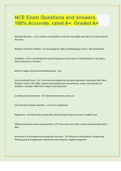-
1. Exam (elaborations) - Nce and cpce study guide questions with accurate answers, rated a+
-
2. Exam (elaborations) - Nce/cpce exam top-notch study guide, questions coverage with accurate answers, rated ...
-
3. Exam (elaborations) - Helwig nce & cpce prep (hgrd). top exam questions and answers, 100% accurate, graded...
-
4. Exam (elaborations) - Nce and cpce top exam questions with accurate answers, rated a+
-
5. Exam (elaborations) - Nce and cpce: social and cultural foundations. top exam questions with accurate answe...
-
6. Exam (elaborations) - Cpce/nce exam. jmayy, exam questions with accurate answers, rated a+
-
7. Exam (elaborations) - Nce + cpce questions test bank. all examinable questions with accurate answers. 100% ...
-
8. Exam (elaborations) - Nce/cpce--group counseling and assessment questions with accurate answers, 100% accur...
-
9. Exam (elaborations) - Nce & cpce multiple choice chapters 3, 6, 7, & 8. all examinable questions with accur...
-
10. Exam (elaborations) - Nce-cpce practice exam #1, top exam question with accurate answers, rated a+
-
11. Exam (elaborations) - Nce / cpce study sets questions prepping. rated a+. verified.
-
12. Exam (elaborations) - Cpce/nce theorists, all covered. 100% accurate. verified.
-
13. Exam (elaborations) - Cpce/nce exam prep, question sections coverage, graded a+, latest update.
-
14. Exam (elaborations) - Nce/cpce terms - lifestyle and career development, questions sections with accurate a...
-
15. Exam (elaborations) - Nce/cpce test bank top exam questions with accurate answers, 100% accurate, rated a+
-
16. Exam (elaborations) - Cpce + nce career development, top question & answers, rated a+. 100% accurate.
-
17. Exam (elaborations) - Cpce/nce - career counseling, questions and answers, 100% accurate, rated a+
-
18. Exam (elaborations) - Nce exam questions and answers, 100% accurate, rated a+. graded a+
-
19. Exam (elaborations) - Practice exam 1 (nce), top exam exam questions and answers, 100% accurate.
-
20. Exam (elaborations) - Nce practice test questions and answers with rationale, 100% accurate, rated a+
-
21. Exam (elaborations) - Nce/lpc exam study guide, questions and answers, 100% accurate, rated a+
-
22. Exam (elaborations) - Nce study guide, questions and answers, 100% accurate, rated a+
-
23. Exam (elaborations) - Nce study guide (rosenthal), questions with answers, rated a+. 100% a+
-
24. Exam (elaborations) - Nce practice test questions, questions and answers, rated a+. graded a+
-
25. Exam (elaborations) - Nce national counseling exam questions and answers, 100% accurate, rated a+
-
26. Exam (elaborations) - Nce exam review questions & answers, 100% accurate, graded a+.
-
27. Exam (elaborations) - Nce practice exam top questions with accurate answers, 100% accurate.
-
28. Exam (elaborations) - Nce career counseling, questions & answers, 100% accurate, rated a+
-
29. Exam (elaborations) - Nce and cpce study guide questions and answers, 100% accurate. verified.
-
30. Exam (elaborations) - Nce study guide questions and answers, 100% accurate, rated a+
-
31. Exam (elaborations) - Nce exam – appraisal top exam questions and answers, 100% accurate, rated a
-
32. Exam (elaborations) - Nce: research and program evaluation. pilot study preparation, questions & answers, r...
-
33. Exam (elaborations) - Nce ethics, questions & answers, 100% accurate, rated a+
-
34. Exam (elaborations) - Chim nce practice exam 1 top questions with accurate answers. rated a+
-
35. Exam (elaborations) - Nce exam: lifestyle and career development. top exam questions with accurate answers,...
-
36. Exam (elaborations) - Nce exam theory, top questions and answers, 100% accurate. verified
-
37. Exam (elaborations) - Nce assessment & testing practice questions & answers, latest update. verified.
-
38. Exam (elaborations) - Nce: theories & theorists. full coverage, latest update. rated a+
-
39. Exam (elaborations) - Nce exam: professional orientation and ethics, top exam questions (answered), rated a...
-
40. Exam (elaborations) - Nce exam - professional orientation and ethics. questions and answers, 100% accurate,...
-
41. Exam (elaborations) - Nce exam - counseling and helping relationship. questions with accurate answers, 100%...
-
42. Exam (elaborations) - Nce exam (counseling theories). top exam questions and answers, 100% accurate.
-
43. Exam (elaborations) - Nce and cpce study guide questions and answers. 100% accurate, graded a+
-
44. Exam (elaborations) - Nce and cpce study guide, questions and answers, 100% accurate. graded a+
-
45. Exam (elaborations) - Nce and cpce study guide, questions and answers, 100% accurate. graded a+
-
46. Exam (elaborations) - Nce practice test #6 health information science practice questions and answers, rated...
-
47. Exam (elaborations) - Chime nce practice exam 1 top questions with accurate answers, rated a+
-
Show more




